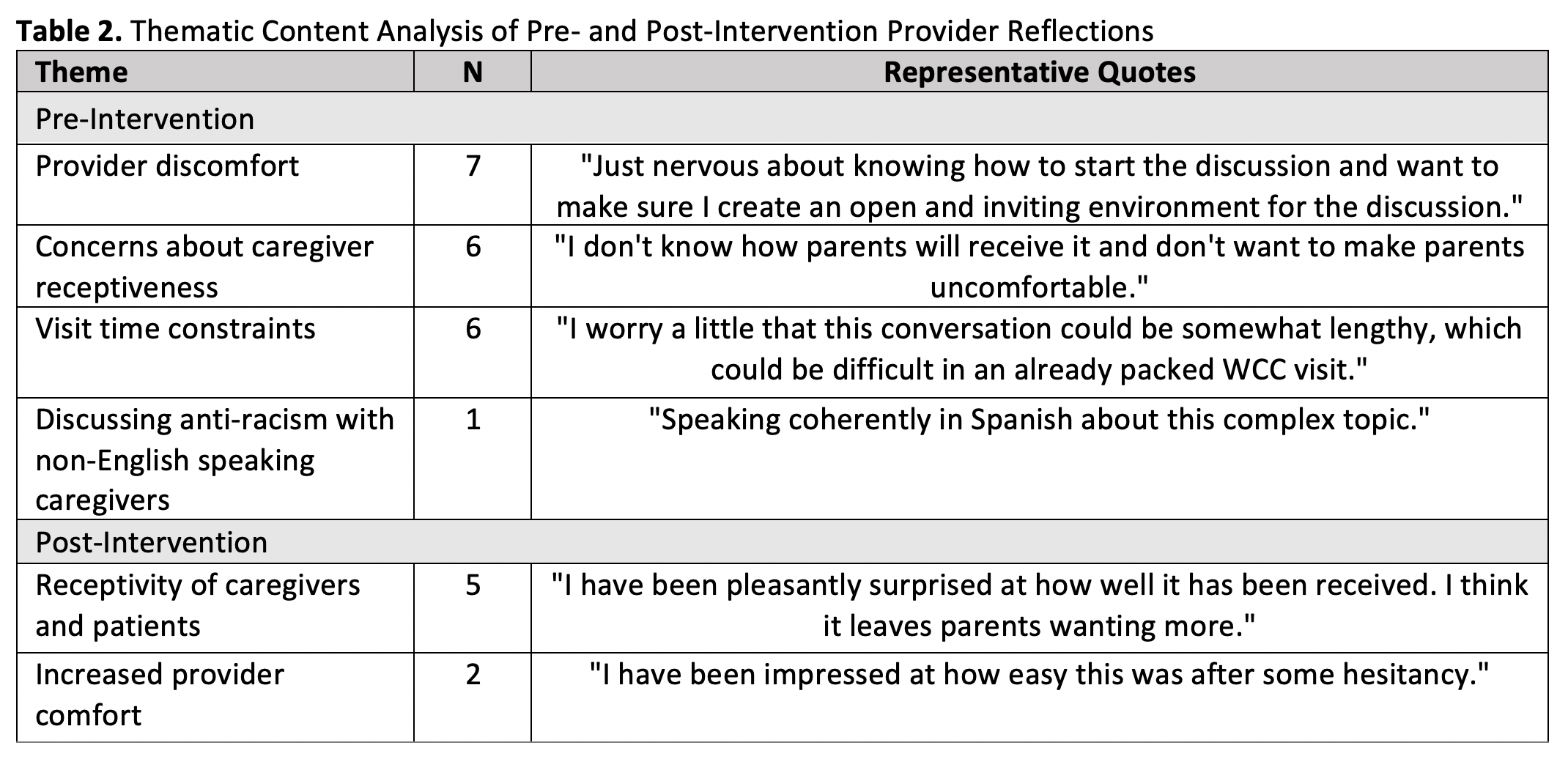Medical Education 6: Health Equity
Session: Medical Education 6: Health Equity
441 - Antiracist Curriculum in Primary Care: Training Pediatricians to Discuss Racial Justice During Well-Child Visits
Saturday, April 26, 2025
2:30pm - 4:45pm HST
Publication Number: 441.3589
Juliana Lawrence, Boston Children's Hospital, Brookline, MA, United States; Niraj Sharma, Boston Children's Hospital, Needham, MA, United States; Ronnye Rutledge, Emory University School of Medicine, Atlanta, GA, United States; Christopher F. Calahan, Harvard Medical School, Boston, MA, United States; Kaitlyn R. Shank, MASSACHUSETTS GENERAL HOSPITAL, Boston, MA, United States; Rohan Khazanchi, Harvard Internal Medicine-Pediatrics Residency Program at Brigham & Women's Hospital, Boston Children's Hospital, and Boston Medical Center, Boston, MA, United States; Derek R. Soled, Boston Children's Hospital, Brigham and Women’s Hospital, Boston Medical Center, Boston, MA, United States; Madeline Pesec, Boston Children's Hospital, Boston, MA, United States; Mariel Bailey, Kaiser Permanente, Oakland, CA, United States; Jennifer Kasper, Brigham and Women's Hospital, Boston, MA, United States; Colleen Monaghan, Brigham and Women's Hospital/AAIM, Needham, MA, United States

Juliana C. Lawrence, MD, MMSc (she/her/hers)
Resident Physician
Boston Children's Hospital, Brigham and Women's Hospital
Brookline, Massachusetts, United States
Presenting Author(s)
Background: Children experience impacts of racism across multiple levels, resulting in racial health and social inequities. The American Academy of Pediatrics (AAP) recommends that pediatricians counsel families of all races on racism’s effects, but training programs to support this guidance are lacking.
Objective: To pilot a novel curriculum training pediatricians to discuss race and antiracism during well-child visits.
Design/Methods: We developed a training program for pediatricians at two academic clinic sites in Boston, MA. A voluntary, in-person session with scripted role-play and case-based discussions on age-appropriate racial justice conversations was held in October 2020, supported by integrated note templates and caregiver handouts. Anonymous pre- and 6-months post-intervention clinician surveys included open-ended questions and 5-point Likert scales (1- “Strongly Disagree” to 5- “Strongly Agree”) assessing provider comfort, anticipated caregiver receptivity, and perceived importance. Caregivers completed open-ended surveys after visits with trained providers. Pre- and post-training Likert scale responses were compared using Mann-Whitney U and Wilcoxon signed rank tests with similar results. Open-ended responses were coded and analyzed via thematic content analysis with NVivo software (v15).
Results: Twenty-nine clinicians (17 residents, 10 attendings, and 2 APPs) participated in the training program. Of these, 25 completed the pre-intervention survey and 13 completed the post-intervention survey. Responses were also gathered from 97 caregivers. Post-intervention, pediatricians were significantly more likely to discuss race during well-child visits (0% vs 100%) and reported increased comfort leading racial justice conversations (median 3 vs 4, p< 0.001), higher anticipated caregiver receptivity (median 3 vs 4, p=0.001), and greater assessed importance (median 4 vs 5, p=0.08). In pre-training thematic analysis, clinicians expressed concerns regarding caregiver receptivity, time constraints, and discomfort; post-intervention, they reported increased comfort and perceived caregiver openness. Among caregivers, 92% found the racial justice information helpful and 89% felt it was important for pediatricians to discuss race and racism at well-child visits. Caregivers offered positive reflections in thematic analysis on the conversations and their importance.
Conclusion(s): This pilot training program was feasible and well-received by clinicians and caregivers. It equipped pediatricians with tools to apply AAP guidelines and integrate antiracism into clinical practice, warranting further development and research.
Table 1. Pre- and Post-Intervention Provider Surveys

Table 2. Thematic Content Analysis of Pre- and Post-Intervention Provider Reflections

Table 3. Thematic Content Analysis of Caregiver Responses

Table 1. Pre- and Post-Intervention Provider Surveys

Table 2. Thematic Content Analysis of Pre- and Post-Intervention Provider Reflections

Table 3. Thematic Content Analysis of Caregiver Responses


